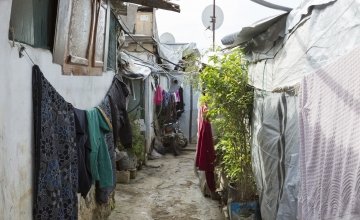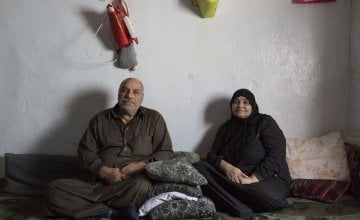
Read our 2024 annual report

Knowledge Hub
10 Years Without a Home: Concern asks Ireland not to forget those still caught up in Syrian civil war

Syrian people have spoken of the heart break and harsh realities of living for the last 10 years without a permanent home, having been forced to flee fighting and take refuge abroad or elsewhere in Syria.
To mark the 10th anniversary of the start of the conflict, Syrian refugees were interviewed in recent weeks by Concern Worldwide to provide an insight into the human impact of the war. They said:
- “These have been a very difficult 10 years, it feels like 100 years to me, especially when we were still in Syria . . . From the moment I lost my husband. I think I lost my life too, I feel no hope. I live only for my children,” - Fatima* left Syria for Turkey with her three children after her husband was killed by militants;
- “We have forgotten the meaning of joy. Joy is dead to us. The most important thing to a human being is happiness and joy… all these things do not exist anymore.” - Khaled*, who fled to Lebanon with his wife Fatima and their seven children in 2012;
- “War shatters dreams. We used to dream about a better life, but reality has become something completely different . . . I lost everything. I lost my income and my house was destroyed” -- said Latif* who left for Turkey with his wife, Salma*, and their five children in 2014.
This week (March 15) marks 10 years since the start of the civil war in Syria. One of the most deadly and destructive conflicts in recent times, it’s estimated that since 2011, 593,000 Syrian people have been killed, half the population (11.5 million) have fled their homes, including 5.5 million who have taken refuge abroad.
Hostilities and violence continue across Syria. There have been recent air strikes in Idlib in the north, turbulence in the south-west, civilians and aid workers continue to be killed, while military conscription continues.
Those who spoke to Concern, the Irish humanitarian and development organisation, described how they have lost all hope and live only for their children; to see them have a better and safer future. They have appealed to the Irish and international community to secure peace in Syria, so that they may one day return home.
“I miss my sisters and my mother very much, the way Syria smelled, the family meetings, the neighbours. I miss the olive trees, the smell of the linden trees,” said Salma*. After three years of enduring the war, she, her husband Latif and five children left Syria for Turkey in 2014 when bombing started in front of their home.
The family spent four years moving between different refugee camps in Turkey before finally moving into a house. “War shatters dreams. We used to dream about a better life, but reality has become something completely different,” said Latif*. “I lost everything, I lost my income and my house was destroyed.”
Fatima* also left Syria for Turkey with her three children after her husband, a school teacher, was killed by militants. Some 3.6 million Syrians now live in Turkey.
“Life was happy and then completely turned upside down, everything changed as if we were suddenly in another world. These have been a very difficult 10 years, it feels like 100 to me, especially when we were still in Syria,” said Fatima. “From the moment I lost my husband. I think I lost my life too, I feel no hope. I live only for my children,” she added. “Seeing my children go to school here in Turkey, seeing them alive and healthy makes me happy and content.”
The majority of Syrian refugees are hosted by Turkey, Lebanon, Jordan, Iraq and Egypt. Concern are supporting people in three of those: Turkey; Lebanon and Iraq, and within Syria.
Once considered a middle-income economy, eight out of 10 Syrian people now live below the poverty line, unable to afford food, essential drugs and other basic necessities.
Jeen* is an English teacher. She and her mother live in her uncle’s house in the north of Syria after their home was destroyed. “I miss (a sense of) security and safety, that I’ve lost. Since 2011 we struggle to make a living, to keep ourselves and our family safe,” she said. “My faith helped me a lot through the last 10 years. I accept reality, the reality of war that I live in. I saw in myself that I can support others too, I support a girl with a disability - that helped me to be strong,” she added.

In Lebanon, a country with a similar population to the island of Ireland, 1 in 4 (28%) people living in the country are Syrian or Palestinian refugees.
Khaled*, his wife Fatima and their seven children fled to Lebanon in 2012. A former public sector worker, Khaled’s family had a large two-storey house in Syria, and land on which he grew fruit trees and a vineyard. Now they live in a tent in an informal settlement in northern Lebanon.
“Many things have changed. It is like taking a human from heaven to hell. We have lost our house, I have lost my oldest son, we are missing the smile that used to be on our faces back in Syria,” added Khaled.
“It (the smile) used to come out straight from the heart. Now our smiles are possibly there just to compliment others. We have forgotten the meaning of joy. Joy is dead to us. The most important thing to a human being is happiness and joy… all these things do not exist anymore.”
“The situation for Syrian refugees and internally displaced people is the worst it has ever been as a result of the triple crises i.e. ongoing conflict, rapidly deteriorating economic situations which are compounded by the COVID-19 pandemic”, said Brid Kennedy, Regional Director for Concern. “With the political uncertainty and deteriorating economies, it’s important that we don’t forget about the Syrian people stuck in limbo as the conflict drags on and that we continue to offer hope for brighter futures,” she added.
For media queries contact Eilis Staunton, Media Relations officer at eilis.staunton@concern.net or 085 872 0720.
*names changed to protect their identities.
Note to editors:
A short video featuring Khaled* Fatima* and another Syrian refugee couple in Lebanon can be found here: https://www.youtube.com/watch?v=xHPItnuceRI
Bríd Kennedy is available for interview.
Voiced over audio clips of Latif, Salma and Fatima in Turkey, Khaled and Fatima in Lebanon and Jeen (in English) in Syria are also available, on request.
Concern Worldwide has been working in Lebanon and Turkey for eight years, in response to the influx of refugees into those countries. The organisation started operations in Syria also in 2013, and started working in Iraq in 2018.
Other ways to help
Corporate support
Is your company interested in working together for a common cause?
Fundraise for Concern
From mountain trekking to marathon running, cake sales to table quizzes, there are lots of ways you can support our work.
Buy a gift
With an extensive range of alternative gifts, we have something to suit everybody.
Leave a gift in your will
Leave the world a better place with a life-changing legacy.
Volunteer with Concern
The lots of ways to get involved with our work as a volunteer
School fundraising
Without the generous support from schools, we wouldn't be able to do the work that we do.

